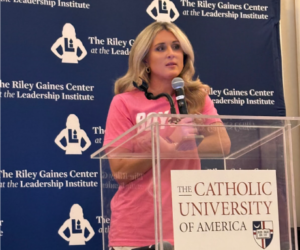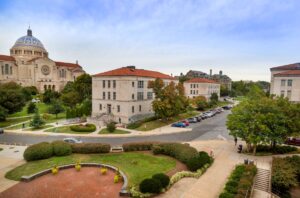Q & A With President Garvey on Sexual Abuse in the Catholic Church

Courtesy of Catherine O'Grady

By Catherine O’Grady
President John Garvey, Rev. Jude DeAngelo and Sister Nancy Bauer, assistant professor of canon law, took part in a panel about the recent sexual assault scandal in the Catholic Church on Tuesday, November 6. The event was held in the Koubek Auditorium in the Edward M. Crough Center for Architectural Studies and was hosted by senior philosophy major and President of the Humanitas organization, Francisco Flores-Pourrat.
The discussion was directed by questions submitted by email and focused on the resignation of Cardinal Donald Wuerl, how the three panelist reacted to the sexaul assault allegations in the Pennsylvania Grande Jury Report and how the Catholic Church should respond moving forward.
The event started with a brief lecture by Garvey and then transitioned into a group discussion between the three panelists and led by Flores-Pourrat. The panelists spent time discussing the church culture in the 1980’s and 1990’s that has led to this current crisis.
This Q & A was different than the Response to the Crisis in the Catholic Church series held earlier this semester. This was the first panel with Garvey and DeAngelo after the resignation of former Archbishop Wuerl, which was accepted by Pope Francis on October 12. Events like these are part of a continuing effort from the administration to promote communal healing and transparency about the crisis.
A Catholic University politics professor submitted a question asking if the clergy should be allowed to marry as a way to avoid future issues with sexual assault.
“Molesting children is not about sex. It is about power. It is about violence. It is not about a love relationship,” DeAngelo said.
“I’m not excusing the behavior, I’m just saying we live in a time that wants immediate answers and they want to know things: is this going to be stopped?” said DeAngelo. “I think we are foolish to say it’s going to stop. It’s not going to stop in the church, it’s not going to stop in our families it’s not going to stop in our public schools. Why? Because there’s this thing called sin.”
“People began to really think more in terms of legal issues rather than pastoral,” said DeAngelo, in response to a question about the Church’s response to these allegations.
”I don’t think that lawyers ought to be advising the church when it’s their client about how to escape with a liability,” said Garvey. ”That’s not what their client should want.”
As a result of the accusations, the United States Conference of Catholic Bishops is having a meeting on November 12-14. DeAngelo warned that if the issue is not addressed correctly he worries about losing members of the Church.
“If the bishops don’t do something really quick to remedy this situation in terms of asking for forgiveness out of this November meeting, we will see a lot people leave,” he said.
Bauer called for “priests with psychological and sexual maturity.”
The topic of Wuerl’s role as chancellor was also brought up in conversation and how his position has changed since his resignation.
Garvey commented that Wuerl “has been slightly disengaged from things that he might otherwise have put through to conclusion rapidly,”due to the circumstances of his resignation.
The chancellor of the Catholic University of America is usually a position held by the Archbishop of Washington, D.C. However, most other dioceses appoint a lay person as chancellor.
“The chancellor of a diocese can be and usually is a lay person and in this country, the chancellor has a broader job description,” said Bauer. This dioceses is in a unique position because the Archbishop is also the chancellor of Catholic University.
“I think it might be helpful when a diocese is vacant, as is the archdiocese of Washington D.C. right now,to have some means of hearing from lay people, what do we need now in this archdiocese in a bishop? What qualifications? We might right off the cuff say someone who can heal,” suggested Bauer, in regards to Wuerl’s replacement.
As for the future of the church, DeAngelo encouraged prayer for diocesan priests. “They’re really suffering… They mostly suffer alone.”
DeAngelo not only calls for justice for the victims but mercy for the perpetrators.
“We are not doing our job if we’re just getting to justice,” he said “We have got to get to mercy.”







